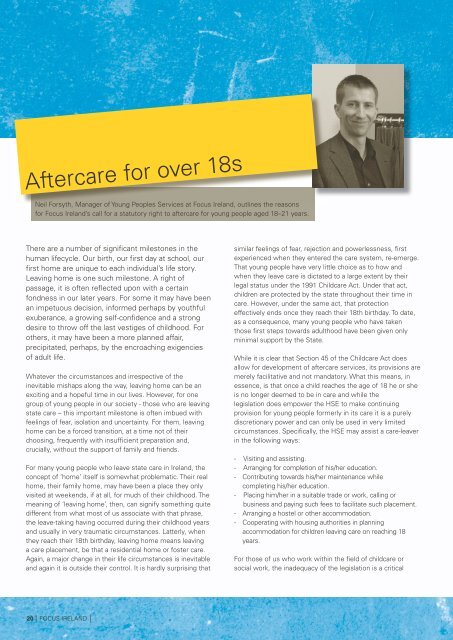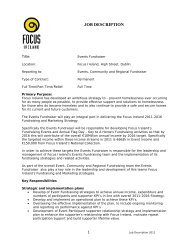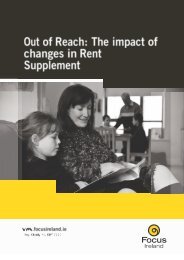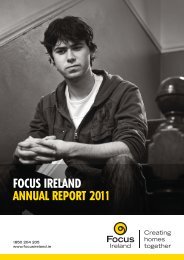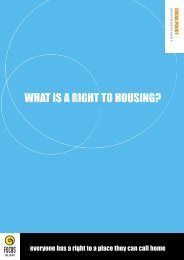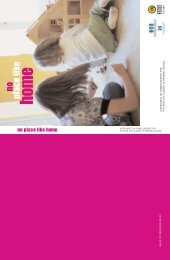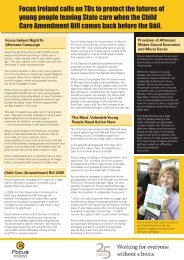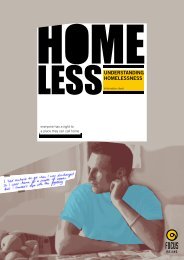Bridging the gap: from care to home - Focus Ireland
Bridging the gap: from care to home - Focus Ireland
Bridging the gap: from care to home - Focus Ireland
Create successful ePaper yourself
Turn your PDF publications into a flip-book with our unique Google optimized e-Paper software.
After<strong>care</strong> for over 18s<br />
Neil Forsyth, Manager of Young Peoples Services at <strong>Focus</strong> <strong>Ireland</strong>, outlines <strong>the</strong> reasons<br />
for <strong>Focus</strong> <strong>Ireland</strong>’s call for a statu<strong>to</strong>ry right <strong>to</strong> after<strong>care</strong> for young people aged 18–21 years.<br />
There are a number of significant miles<strong>to</strong>nes in <strong>the</strong><br />
human lifecycle. Our birth, our first day at school, our<br />
first <strong>home</strong> are unique <strong>to</strong> each individual’s life s<strong>to</strong>ry.<br />
Leaving <strong>home</strong> is one such miles<strong>to</strong>ne. A right of<br />
passage, it is often reflected upon with a certain<br />
fondness in our later years. For some it may have been<br />
an impetuous decision, informed perhaps by youthful<br />
exuberance, a growing self-confidence and a strong<br />
desire <strong>to</strong> throw off <strong>the</strong> last vestiges of childhood. For<br />
o<strong>the</strong>rs, it may have been a more planned affair,<br />
precipitated, perhaps, by <strong>the</strong> encroaching exigencies<br />
of adult life.<br />
Whatever <strong>the</strong> circumstances and irrespective of <strong>the</strong><br />
inevitable mishaps along <strong>the</strong> way, leaving <strong>home</strong> can be an<br />
exciting and a hopeful time in our lives. However, for one<br />
group of young people in our society - those who are leaving<br />
state <strong>care</strong> – this important miles<strong>to</strong>ne is often imbued with<br />
feelings of fear, isolation and uncertainty. For <strong>the</strong>m, leaving<br />
<strong>home</strong> can be a forced transition, at a time not of <strong>the</strong>ir<br />
choosing, frequently with insufficient preparation and,<br />
crucially, without <strong>the</strong> support of family and friends.<br />
For many young people who leave state <strong>care</strong> in <strong>Ireland</strong>, <strong>the</strong><br />
concept of ‘<strong>home</strong>’ itself is somewhat problematic. Their real<br />
<strong>home</strong>, <strong>the</strong>ir family <strong>home</strong>, may have been a place <strong>the</strong>y only<br />
visited at weekends, if at all, for much of <strong>the</strong>ir childhood. The<br />
meaning of ‘leaving <strong>home</strong>’, <strong>the</strong>n, can signify something quite<br />
different <strong>from</strong> what most of us associate with that phrase,<br />
<strong>the</strong> leave-taking having occurred during <strong>the</strong>ir childhood years<br />
and usually in very traumatic circumstances. Latterly, when<br />
<strong>the</strong>y reach <strong>the</strong>ir 18th birthday, leaving <strong>home</strong> means leaving<br />
a <strong>care</strong> placement, be that a residential <strong>home</strong> or foster <strong>care</strong>.<br />
Again, a major change in <strong>the</strong>ir life circumstances is inevitable<br />
and again it is outside <strong>the</strong>ir control. It is hardly surprising that<br />
similar feelings of fear, rejection and powerlessness, first<br />
experienced when <strong>the</strong>y entered <strong>the</strong> <strong>care</strong> system, re-emerge.<br />
That young people have very little choice as <strong>to</strong> how and<br />
when <strong>the</strong>y leave <strong>care</strong> is dictated <strong>to</strong> a large extent by <strong>the</strong>ir<br />
legal status under <strong>the</strong> 1991 Child<strong>care</strong> Act. Under that act,<br />
children are protected by <strong>the</strong> state throughout <strong>the</strong>ir time in<br />
<strong>care</strong>. However, under <strong>the</strong> same act, that protection<br />
effectively ends once <strong>the</strong>y reach <strong>the</strong>ir 18th birthday. To date,<br />
as a consequence, many young people who have taken<br />
those first steps <strong>to</strong>wards adulthood have been given only<br />
minimal support by <strong>the</strong> State.<br />
While it is clear that Section 45 of <strong>the</strong> Child<strong>care</strong> Act does<br />
allow for development of after<strong>care</strong> services, its provisions are<br />
merely facilitative and not manda<strong>to</strong>ry. What this means, in<br />
essence, is that once a child reaches <strong>the</strong> age of 18 he or she<br />
is no longer deemed <strong>to</strong> be in <strong>care</strong> and while <strong>the</strong><br />
legislation does empower <strong>the</strong> HSE <strong>to</strong> make continuing<br />
provision for young people formerly in its <strong>care</strong> it is a purely<br />
discretionary power and can only be used in very limited<br />
circumstances. Specifically, <strong>the</strong> HSE may assist a <strong>care</strong>-leaver<br />
in <strong>the</strong> following ways:<br />
- Visiting and assisting.<br />
- Arranging for completion of his/her education.<br />
- Contributing <strong>to</strong>wards his/her maintenance while<br />
completing his/her education.<br />
- Placing him/her in a suitable trade or work, calling or<br />
business and paying such fees <strong>to</strong> facilitate such placement.<br />
- Arranging a hostel or o<strong>the</strong>r accommodation.<br />
- Cooperating with housing authorities in planning<br />
accommodation for children leaving <strong>care</strong> on reaching 18<br />
years.<br />
For those of us who work within <strong>the</strong> field of child<strong>care</strong> or<br />
social work, <strong>the</strong> inadequacy of <strong>the</strong> legislation is a critical<br />
20 | FOCUS IRELAND |


